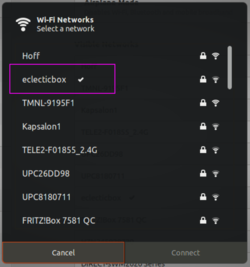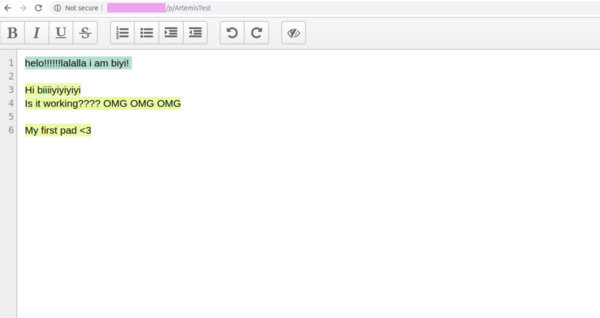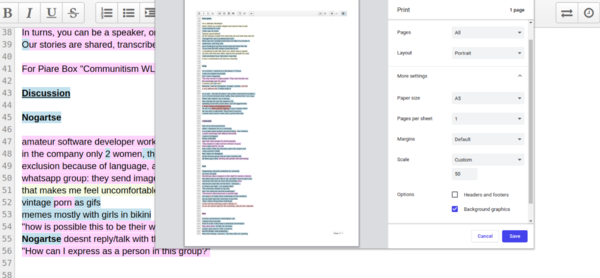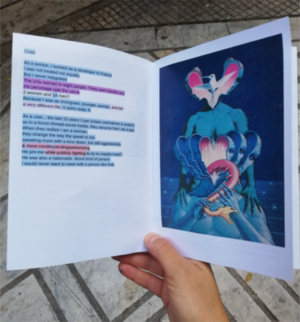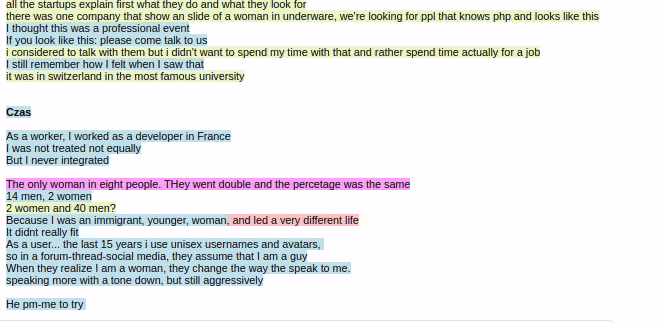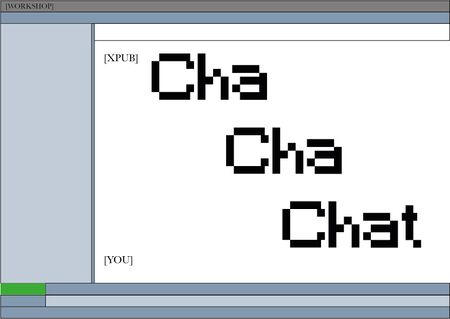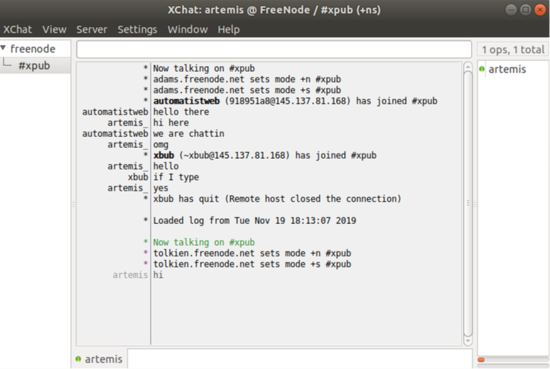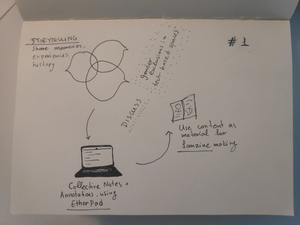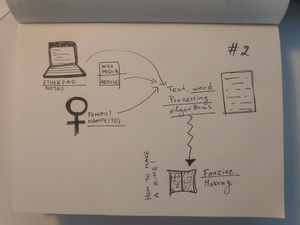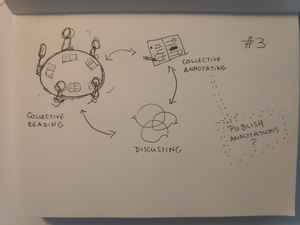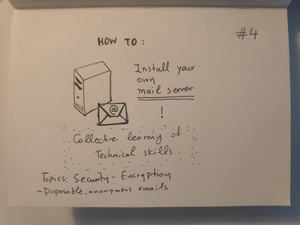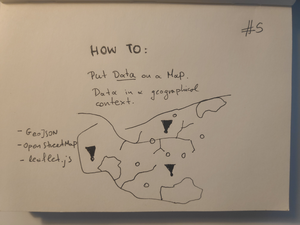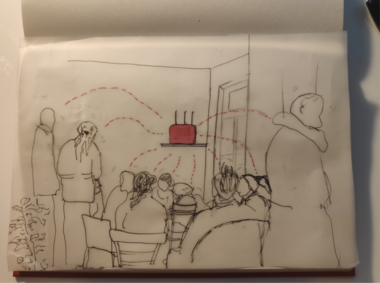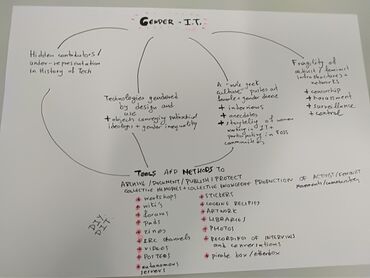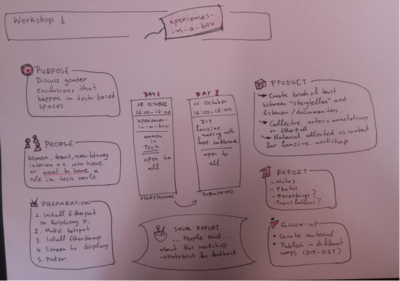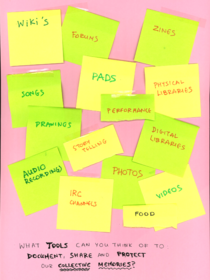User:Artemis gryllaki/GradPrototyping
Hack Pact
#H1_Setting up a Raspberry Pi as a Wireless Access Point
For this step, I used the guide from Networks Of Ones Own, on How to build my own etherbox!
Build-your-own-etherbox
- Install and setup Raspbian Lite on Raspberry Pi 3
- Enable SSH
- Setup hotspot
- Assign a static IP address to the Pi
#H2_Install Etherpad on Raspberry Pi
- I installed Etherpad on my Raspberry Pi, in order to use it for collaborative real-time writing and editing.
#H3_Document a session of story-sharing and discussion using Etherpad
- People in a feminist hack meeting want to preserve their anonymity, so for documenting a collective discussion a tool like Etherpad is preferred, instead of audio/video recordings. The real-time, multi-authorship editing helped in correcting mistakes, adding notes from different people simultaneously.
- Notes from the Etherpad were exported in PDF format, using Ctrl+p in Chrome, with the option "Background graphics" enabled, in order to keep authorship colours.
#H4_Fanzine making using Inkscape and Scribus
- Inkscape used to crop the pdf in smaller pieces (short stories), so they could be used in the layout later.
- FTP server a Raspberry Pi to share images/sketches/photos, that can be used in the layout.
- Scribus used to create a basic layout from the images selected in the FTP server, and the cropped short stories from the Etherpad. Export the file in A4 pdf.
- Print fanzine!
#H5_Create PDF booklet using a script
- A recipe that turned the A4 pdf into a ready-to-print booklet: https://gitlab.constantvzw.org/zine-machines/workshop-scripts/tree/master/booklet
#H6_Gif making to capture the process collective writing in Etherpad
- Peek used for screen-recording and GIF-making.
- Gifsicle to edit the GIF, for example, to resize and optimise it.
Py.rate.chnic Sessions!
Cha Cha Chat
In this workshop, we will look into alternative tools for communicating online, by experimenting with a locally installed chat-software. Through this process, we will talk about the issue and appeal of popular chat applications.
We don't claim that there is an ideal instant-messaging tool to serve everyone's interest. Rather, we aim to discuss how distinct tools can fit different contexts and circumstances. What situations demand the use of alternative communication tools, and why is it useful to try them?
Join us and let's chat using our own network!
Title
Cha Cha Chat: Chat about Chat, through an Internet Relay Chat :-)
Who is leading the workshop
Rita & Artemis
Format
Workshop
Key topics
Chat protocols, social media platforms, social aspects of networks
Short description
Relevance to our own research.
(Artemis) My research focuses on feminist hack & tech initiatives. I have observed that activist and feminist communities primarily choose alternative/self-hosted/non-commercial tools for their everyday communication. An interesting case is that of the Internet Relay Chat. “Why these contemporary user groups – widely considered as disruptive innovators and early adopters – stick to a museological chat technology despite its obvious limitations within the current technological landscape?” (Maxigas, 2017). While practically testing an unpopular instant-messaging tool like IRC within a group, I want to discuss how this choice is useful and/or important for participants in feminist hackerspaces. What attitude towards technology does it propose and what comment does it make on the fallacies of mainstream social media.
(Rita) For me is about amplifying strategies on social media to research and practice agency. The exercise of several actions and people demonstrate a wish for users to be heard and stay in control. One of these movements is decentralised networks, such as the IRC chat we will use today.
What will happen
In this workshop we will:
- Talk about alternative chat protocols. Which ones do we already know? What chat/apps/platforms do we use every day?
- Provide printed instructions for the tool we'll use and a list of existing tools to explore later.
- Build and/or try basic chat tools (e.g command-line, basic local network to share ip, python, IRC etc); activities e.g. Create ASCII nickname etc.
- Discuss these tools. Compare to mainstream chat apps we use every day; potential, purposes (education, awareness, experiment, privacy issues etc) We will have prepared questions to guide the conversation, especially important if the group has little experience with the topic.
- Use the chat as a documentation tool to document the discussion.
- Have a printer connected to our local network to directly print that is being written in the chat. (e.g. dot-matrix) Or save it first and then print.
Why (relevance)?
- Get our audience to know chat protocols, apps and platforms besides the mainstream ones.
- Give and receive input about chat applications in our lives.
- Experiment with low-tech or alternative ways of creating/using chat tools.
- Open up discussions about why alternative tools exist, e.g. for privacy, surveillance, self-education, gain agency with technology, autonomous communication.
- Discuss for whom is this useful and/or important.
Outcome: what will be goal of the session?
We will use the tested chat tool to document and publish our discussion. We will save the chat logs in a text file, and instantly print it using a printer connected to our network.
maximum amount of participants
10
Prerequisites: reading list, software installs, material to bring
Computers from school? In this case, software could already be installed. Do participants bring laptops?
Technologies in the context of feminist hack initiatives
I aim to create an informal research group, inviting people who are interested in exploring collectively, technologies and infrastructures used in the context of feminist hack/tech initiatives.
The meetings and workshops of this research group could lead to a publication, e.g. a guide that documents situated technical tools, together with the reasons why these tools are useful in this particular context. I imagine that a guide like this would be conceptually stronger, when published together with interviews of people who participate and organise feminist hack initiatives, such as /ETC.
Main interest: how technologies used during the organisation of a feminist hack event are important or necessary for the participants and organisers, in order to communicate online, to document and archive their events, to publish and protect their work.
IRC
~Chat for everyday backstage communication during organising an event.
First Experiments
Freenode IRC server:Join the #xpub channel. Using XChat, an IRC client for Linux.
Python script from Michael Murtaugh to create an IRC bot.
Tweaking Michael's code to make a simpler bot. I'm planning to use an IRC bot in the Py.rate.chnic workshop, in order to save the IRC log in a text file, and maybe print in dot-matrix printer using a key word.
from __future__ import print_function
import irc.bot
import sys, time
from thread import start_new_thread
def chunks(l, n):
""" Yield successive n-sized chunks from l.
"""
for i in xrange(0, len(l), n):
yield l[i:i+n]
class Bot (irc.bot.SingleServerIRCBot):
def __init__(self, channel, nickname, server, input, port=6667, idle=False):
irc.bot.SingleServerIRCBot.__init__(self, [(server, port)], nickname, nickname)
self.input = input
self.channel = channel
def on_welcome(self, c, e):
c.join(self.channel)
print ("join", file=sys.stderr)
#start_new_thread(self.receive, (c,))
def on_pubmsg(self, c, e):
# e.target, e.source, e.arguments, e.type
msg = e.arguments[0]
#tstr = time.strftime("%H:%M:%S", time.localtime())
nick = e.source.split("!", 1)[0]
if "hello" in msg:
c.privmsg(self.channel, "hi i'm lola")
# print ("pubmsg: {0}".format(msg), file=sys.stderr)
if __name__ == "__main__":
from argparse import ArgumentParser
parser = ArgumentParser()
parser.add_argument('--server', default='irc.freenode.net', help='server hostname (default: localhost)')
parser.add_argument('--port', default=6667, type=int, help='server port (default: 6667)')
parser.add_argument('--channel', default='#botopera', help='channel to join (default: #botopera)')
parser.add_argument('--nickname', default='pipebot', help='bot nickname (default: pipebot)')
parser.add_argument('--input', default=sys.stdin, help='input')
parser.add_argument('--idle', default=False, action="store_true", help='output idle messages')
args = parser.parse_args()
bot = Bot(args.channel, args.nickname, args.server, args.input, port=args.port, idle=args.idle)
bot.start()
Δchat
~App for chatting over email; using the existing email server network.
GNU Mailman
~For managing electronic mailing lists.
Mastodon
~For self-hosted social networking services.
Wiki
~For documentation around feminist hack communities, gatherings etc.
Etherpad
~For real-time multi-authorship writing and editing.
Nextcloud
~For creating and using file hosting services.
Inkscape, GIMP, ImageMagick
~F/LOSS tools for design in order to create posters, stickers, flyers, zines
Feminist server
~Infrastructure to resist
- Digital targeting of women, feminists, queer, people of colour etc.
- The centralisation of the Internet and its transformation to a consumption sanctuary and space for surveillance.
- The control and tracking of dissent voices by governments among others.
+++ Work in progress +++

